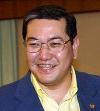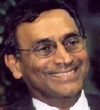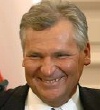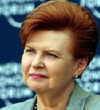During his visit with SG Annan yesterday, South Korea’s Foreign Affairs Minister (and suggested SG candidate himself) Ban Ki-moon noted that South Korea is “seriously considering the idea of presenting a Korean national as a candidate to succeed Kofi Annan.” He declined to say whether he would be that candidate, though he is considered the most likely to be nominated. Should South Korea field a candidate though, it would further challenge Asia’s ability to reach consensus on a single contender. Perhaps suggestively, Ban noted last October that “There are already two very good candidates but, you know, when I was in New York last month I heard from many, many member countries that Asia needs to have a very good, credible candidate.”
Archive for January, 2006
News from Korea
Thursday, January 19th, 2006Asia’s Challenge
Wednesday, January 18th, 2006In the Los Angeles Times, Maggie Farley discusses the United States’ (as well as the UK’s) dismissal of the inviolability of regional rotation process for selecting the next SG.
“This organization needs a strong manager, ” said Sichan Siv (U.S. representative to the U.N. Economic and Social Council) who has been helping to vet candidates. “Not a rock star, not a politician, not someone who spends a lot of time on the TV screen. We want someone who gets things done.
“We’ve said that we want the best-qualified person from whatever region of the world that person might come from,” U.S. Ambassador John R. Bolton said in a recent interview. “If it’s an Asian, that’s fine with us. If it’s not an Asian, that’s fine with us too.”
On this point, a China Daily editorial, aware that “[t]he assumption that the job will go to another region has opened up a huge field of possibilities,” appealed to Asian governments,
“…to reach a consensus on who will represent the region to compete for the post. The race should not turn into a game with countries trying to checkmate other nations’ nominees as much as to promote their own. This could lead to paralysis rather than consensus. Agreement can only be reached through negotiations and dialogue, which could be very tough.”
However, the decision by SG Annan to leave departing Deputy SG Louise Fréchette’s position vacant for the remainder of his term will likely increase the intra-regional competition. The Indian government, which had been weighing whether to name a candidate for the #2 spot rather than pursue the top post, is now more likely to field a candidate, possibily nominating UN spokesperson Shashi Tharoor. This would challenge the two declared Asian candidates, Jayanta Dhanapala of Sri Lanka and Surakiart Sathirathai of Thailand, as well as a field of potential others in the region.
Clinton v. Blair?
Tuesday, January 17th, 2006 This weekend, Bill Clinton jokingly remarked that a challenge from Tony Blair (video) for the post of UN Secretary General “would suit me” and suggested that Blair would make a good SG.
This weekend, Bill Clinton jokingly remarked that a challenge from Tony Blair (video) for the post of UN Secretary General “would suit me” and suggested that Blair would make a good SG.
BBC Newsnight’s Jeremy Paxman: “Maybe he should run against you for Secretary General of the UN?”
Clinton: “Well, that would suit me. He would be a good one.”
The remark was made in a moment of good humor as Clinton was asked what he would advise Blair to do in retirement. Both hail from P5 member states, traditionally barred from seeking the position. Clinton, himself once rumored to be interested in the post, would have a better chance of securing the top post, given Blair’s support for the Iraq war. But would it not be an interesting race?
Update (Jan 25): In a USA TODAY/CNN/Gallup pollconducted this past weekend, 66% of Americans say Tony Blair “would be a good secretary-general of the United Nations when he no longer is leading Great Britain.” A similar number of Americans had favorable views of the British prime minister, contrasted with an average of only 34% of Brits since January 2003.
“…and ask, Why Not?”
Friday, January 13th, 2006In UNA-USA’s The InterDependent, Thomas Pickering, former US Ambassador to the UN (1989-92) and now a senior VP with Boeing, remarks to Barbara Crossette that…
“Some years ago…Many of us thought that it was soon going to be the time when the organization should consider whether regional rotation continued to make sense. It obviously limited the number of potential candidates…The interesting thing now is that all the regions of the world have had their candidates serving as secretary-general. This would be an appropriate time to cut loose from that old tradition and open it up. One would hope that at the same time, gender barriers, which seem to have become fairly rigid in connection with this office, would also break down.”
In this month’s Harper’s, Brooking’s Parag Khanna makes an interesting case for throwing out, in one fell swoop, both the regional rotation and the abstention of P5 nationals in running for the post of SG:
“Simply watching any clip of the man in action overseas will demonstrate that America today has not one single citizen even remotely approaching his ability to develop a rapport with foreign leaders — and there is no replacement in sight. The choice for President Bush, therefore, is not betwen any American and a non-American but between Bill Clinton and a non-American.
Given Bush’s patriotic instincts, this should be no choice at all. President Bush must be made to realize that changing the secretary-general is intimately linked to changing the U.N.’s culture and to reconciling the world body with the U.S. Certainly Clinton would use the bully pulpit to try to force the Bush Administration to respect international norms, but Bush would still be doing his party a big favor, particularly if Hillary runs for the White House in 2008. As she seeks to build a political dynasty in Washington to counter the Bushes’, having Bill Clinton at the U.N. would eliminate Republicans’ concerns about having him back at the White House, even as First Man to Hillary. Democrats are desperate for some kind of influence on foreign policy, and Republicans are obsessed with a U.N. cleanup. There is no credible competition for the job from Asia or any other region, and many countries are seeking a candidate who could counter [U.S. Ambassador John] Bolton’s wrath. With the U.N. itself so desperate to find a comprehensive mandate for the future, the combination of so many colliding interests yields only one compromise greater than another lowest common denominator — and he already lives in New York.”
A September Surprise?
Friday, January 13th, 2006Two sources suggest a speedy selection of the next SG, perhaps well before the end of the year. I’m skeptical of these reports and believe they are speculating prematurely, but they are posted here for your reference:
Last week, The Times (UK) reported that U.S. ambassador John Bolton wants Annan’s successor identified by July, but further noted the …
…speculation among insiders that Mr Annan, whose second five-year term expires on December 31, may step down several months early so that he can leave before the next General Assembly session in September.
This week, an article in India’s Daily Times that described the government’s negotiations on whether to put forward a candidate for the Deputy SG position also suggested an early selection date:
“…the successor to Annan is to be elected on September 24 when the UN Assembly meets.”
Update: In speaking with a trusted colleague later today, I was surprised to hear that he had been told that it was not an impossibility that SG Annan might step aside two or three months early. He was cautious however in suggesting that, in his opinion, Annan would only do this if he felt bringing on his successor early would speed the reform efforts Annan supports.
Get it together!
Wednesday, January 11th, 2006As noted before, there has been some discussion among key human rights and similar-minded NGOs on how to reform the SG selection process. A meeting this week in New York brought several groups together to discuss how to open up the selection process, make it more transparent and to brainstorm on candidate selection criteria. Unfortunately, while a few groups want to ramp up the NGO effort as soon as possible, most are only willing to sit back and observe the action at this point.
The options for substantive reform this late in the game are few, but a formal coalition of NGOs pushing for a more transparent process could still influence governments to some degree. Sticking to the bigger picture, i.e. the selection process, may not excite some NGOs who would prefer to argue for or against a candidate based on their government’s record on human rights or other issues, but it’s the only way to present a united front to governments. Such was invaluable in establishing the International Criminal Court, a more fundamental and imposing shift in global politics by any measure.
An early idea of pushing for a formal search committee in the UN system (other than the P5!) is no longer being considered, as no one is under the impression it could happen this year. However, a list of core qualifications – a job description for the SG if you will – suggested and consistently referenced by a broad swath of civil society groups could ensure close scrutiny of candidates and governments as the selection process unfolds. But it won’t happen if NGOs offer competing lists or only participate from the sidelines.
Radio Interview with Equality Now
Tuesday, January 10th, 2006Last month, UN Radio’s Jerry Adams interviewed Taina Bien-Aimé with Equality Now about that organization’s campaign to promote women in the selection of the next SG. A laudable goal, it is unfortunate that the effort is a symbolic one. As Ms. Bien-Aimé noted, the selection of a female SG would send the message that the UN is serious about gender equality and reaching gender parity, and it would acknowledge the importance of including women in the political process for the well-being of the world. A number of the women suggested by the campaign would make outstanding SGs, which makes the symbolic nature of the effort even more disappointing.
Door #1 or Door #2?
Tuesday, January 10th, 2006 Louis Fréchette’s resignation last month had the unexpected consequence of complicating India’s decision whether to field a candidate for the next SG or put forward someone for the position of the Deputy SG. The Daily Times reports that India’s External Affairs Ministry is urging the government to hold out for the top post rather than accept the number two slot.
Louis Fréchette’s resignation last month had the unexpected consequence of complicating India’s decision whether to field a candidate for the next SG or put forward someone for the position of the Deputy SG. The Daily Times reports that India’s External Affairs Ministry is urging the government to hold out for the top post rather than accept the number two slot.
Names floated by those speculating on India’s decision include former external affairs and finance minister Jaswant Singh, Kanwal Sibal, former foreign secretary and India’s current ambassador to Russia, and Shashi Tharoor, presently the Under-Secretary-General for Communications and Public Information. Tharoor has long be suggested as Annan’s succcessor given his eloquence and affability as the UN’s chief spokesperson, but it has been suggested that the Oil for Food scandal would prevent an insider from getting the Security Council’s approval this year. The Daily Times reports that Sibal is supported by Congress President Sonia Gandhi, while Prime Minister Manmohan Singh favors Montek Singh Ahluwalia, former Director of the IMF’s Independent Evaluation Office. .
The question still remains whether India’s push – along with Japan, Germany and Brazil – for a permanent seat on the Security Council could be weakened by its seeking power at the top level of the Secretariat as well. Japan’s decision not to field an SG candidate this year in favor of an SC seat suggest that that government is aware of this possibility. On the other hand, reports of Japan’s distancing from and thus weakening of the G4 effort may encourage India to go for broke.
Short Note on Japan
Monday, January 9th, 2006Betsy Pisik’s column this morning on Japan and the “Group of Four” seeking permanent Security Council seats included this tidbit:
Japan is so focused on the Security Council that it will not field a candidate for secretary-general this year, mindful of the handshake agreement that the permanent council members will not amass too much power by also holding the top office.
The State of Play
Friday, January 6th, 2006The surprising question still is whether an Asian candidate can survive a challenge from Eastern Europe. Most observers acknowledge it’s their turn in the regional rotation and expect an Asian to be chosen, but they aren’t getting the nod as easily as expected. Two candidates from Eastern Europe, the only UN regional group which has yet to provide a Secretary General, have expressed interest and seem to have some staying power at this point.
Asia’s chances are not helped by the fact that the region’s governments are still divided on a candidate. ASEAN, representing 10 of the 54 Asian governments, has endorsed Thai Deputy Prime Minister Surakiart Sathirathai. But he is facing a notable challenge from former ambassador and former Under Secretary General for Disarmament Affairs Jayantha Dhanapala of Sri Lanka. Still other candidates from South Korea, Singapore and East Timor have been mentioned, though only Sathirathai and Dhanapala have officially declared their candidacies.
 Sathirathai has been considered the front runner, but observers are concerned his campaign may be peaking too soon to survive. A leaked memo about former Thai ambassador to the U.S., Kasit Piromya’s views that Sathirathai should withdraw as the U.S. was “unresponsive” and “unexcited” about his candidacy – which could be diplomatese for unimpressed or outright opposed – did not please the Thai Foreign Ministry. They have dismissed the remarks as “inconsistent with the facts” and have sent messages to Thailand’s embassies to reaffirm the Deputy Prime Minister’s qualifications for the post. In the December 22
Sathirathai has been considered the front runner, but observers are concerned his campaign may be peaking too soon to survive. A leaked memo about former Thai ambassador to the U.S., Kasit Piromya’s views that Sathirathai should withdraw as the U.S. was “unresponsive” and “unexcited” about his candidacy – which could be diplomatese for unimpressed or outright opposed – did not please the Thai Foreign Ministry. They have dismissed the remarks as “inconsistent with the facts” and have sent messages to Thailand’s embassies to reaffirm the Deputy Prime Minister’s qualifications for the post. In the December 22
 UPI Chief International Correspondent Roland Flamimi suggests that the Sri Lankan candidate, Jayantha Dhanapala, is favored over Sathirathai by the U.S., China and Russia. But Sathirathai is also claiming to have the latter countries’ support. All that can be said for certain at this point is that both Russia and China have committed to an Asian candidate.
UPI Chief International Correspondent Roland Flamimi suggests that the Sri Lankan candidate, Jayantha Dhanapala, is favored over Sathirathai by the U.S., China and Russia. But Sathirathai is also claiming to have the latter countries’ support. All that can be said for certain at this point is that both Russia and China have committed to an Asian candidate.
 This could weaken the prospects of an Eastern European stealing the show. The two suggested contenders from that region are former Polish president Aleksander Kwasniewski, reportedly supported by the United States, and Latvian president Vaira Vīķe-Freiberga.
This could weaken the prospects of an Eastern European stealing the show. The two suggested contenders from that region are former Polish president Aleksander Kwasniewski, reportedly supported by the United States, and Latvian president Vaira Vīķe-Freiberga.  Russia will almost certainly veto President Kwasnewski for his involvement in the Ukrainian presidential election in 2004 against the Russian-backed incumbent candidate. Ms. Vīķe-Freiberga’s chances of gaining the Security Council’s nod are hurt by her support of the Bush administration and the war in Iraq.
Russia will almost certainly veto President Kwasnewski for his involvement in the Ukrainian presidential election in 2004 against the Russian-backed incumbent candidate. Ms. Vīķe-Freiberga’s chances of gaining the Security Council’s nod are hurt by her support of the Bush administration and the war in Iraq.
More later about NGO discussions on the selection process and possible dark horse candidates. For now, check out this campaign by Equality Now urging the selection of a female Secretary General.






